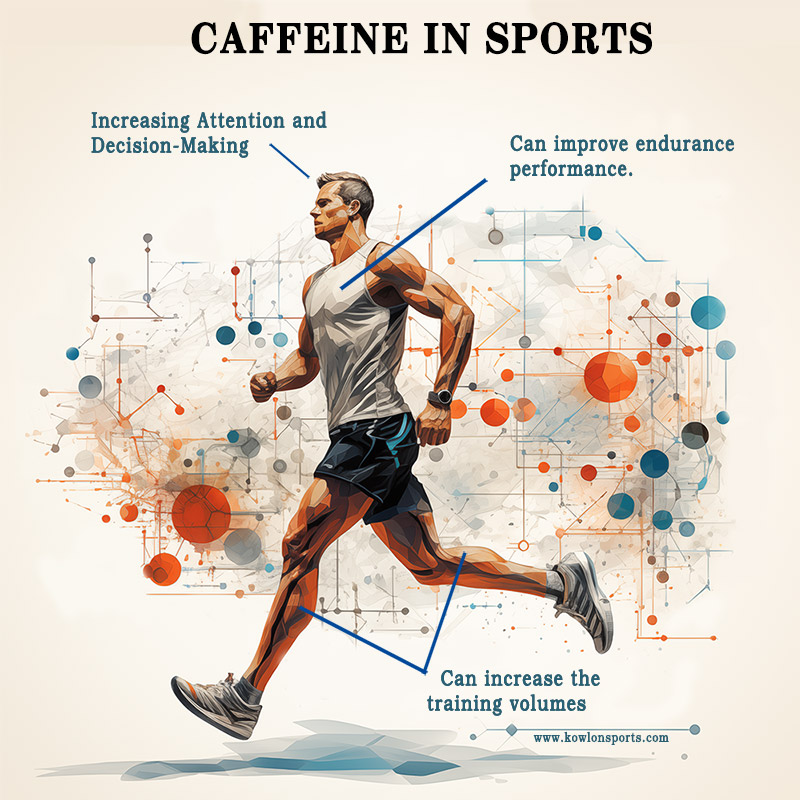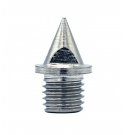Caffeine in Sports Performance
Caffeine in Sports Performance Enhancement, Dosage, and Timing
Introduction
In the dynamic world of sports and athletic performance, caffeine has emerged as a significant player. Known for its stimulating effects, caffeine’s action on performance enhancement is widely recognized, yet it remains a topic layered with complexities. This article delves into the multifaceted role of caffeine in sports, exploring its effects on different performance aspects, individual responses, and practical usage guidelines. (Read as well Nourishing Victory: A Deep Dive into Optimal Nutrition for Athletes
Caffeine and Athletic Performance: A Multifaceted Perspective
Pain Perception and Caffeine
One intriguing aspect of caffeine’s role in sports is its effect on pain perception. Research has shown that acute caffeine ingestion can alter an athlete’s perception of pain, potentially enhancing endurance and resilience. For instance, a study involving cyclists found that a dose of 3-6 mg of caffeine per kg body weight not only improved their cycling time trial performance but also reduced their sensation of effort and discomfort. This pain-modulating effect of caffeine can be a game-changer in sports where endurance and pain tolerance are crucial.

Endurance Performance
Endurance sports, such as marathon running and long-distance cycling, can significantly benefit from caffeine. The improvement in performance linked with caffeine intake is particularly notable in these disciplines. For example, in a study focusing on caffeine on cycling, athletes exhibited enhanced stamina and a marked increase in distance covered. These findings underscore caffeine’s potential in boosting not just the physical aspect but also the mental fortitude required for such grueling events.
Strength and Sprint Performance
Caffeine’s efficacy isn’t limited to endurance sports; it also plays a pivotal role in short, high-intensity activities like sprinting and weightlifting. Studies have indicated that even lower doses of caffeine can lead to significant improvements in strength output and sprint performance. This is particularly relevant in sports that require quick bursts of power, where caffeine can provide that critical edge.
Fatigue and Recovery
Another dimension to consider is caffeine’s impact on fatigue and recovery. Athletes who consume caffeine tend to show greater tolerance to the performance benefits of intense exercise. Notably, caffeine aids in quicker recovery and reduced muscle soreness post-exercise, which is vital for athletes in training and competition phases.

Caffeine and Individual Differences
Understanding the individualized response to caffeine is crucial in harnessing its benefits in sports. The effectiveness of caffeine can vary dramatically among athletes, influenced by genetic factors, habitual consumption, and individual tolerance.
Genetic Factors and Caffeine Response
Research has highlighted significant differences in caffeine metabolism among individuals. For instance, a study showed that athletes with certain genetic variants had a more pronounced response to caffeine supplementation, affecting their performance differently. This was evident in ingestion on endurance performance, where some athletes showed marked improvements, while others did not benefit as much.
Genetic Variants and Caffeine
| Genetic Variant | Effect on Caffeine Metabolism | Impact on Performance |
|---|---|---|
| Variant A | Faster Metabolism | Higher Performance Gain |
| Variant B | Slower Metabolism | Lesser or No Gain |
Habitual Consumption and Performance
Habitual caffeine users may experience a blunted response. A study measuring urine caffeine concentration post-consumption found that regular users had less noticeable performance enhancements compared to non-regular users. This suggests that caffeine or placebo can have different outcomes based on the individual’s caffeine habit.

- Non-regular Users: More likely to experience significant performance improvements.
- Regular Users: Might need higher doses for similar effects.
Individual Tolerance
The dosage of caffeine plays a crucial role in its impact. While 100 mg caffeine may suffice for some, others may require higher doses to feel its effects. However, it’s important to balance the desired performance benefit with potential side effects, such as jitteriness or gastrointestinal discomfort.
Case Study: Caffeine in Chewing Gum
An interesting application is caffeine administered in chewing gum, offering a quick and convenient method of caffeine intake for athletes. Studies have shown its effectiveness in rapidly enhancing performance, especially in team sports where on-the-go energy boosts are essential.
For instance, a study by Jones et al. (2018) in the “Journal of Applied Physiology” demonstrated the varied responses to 100 mg caffeine among different athletes. This highlights the importance of personalized dosing.
Expanded Table: Methods of Caffeine Intake
Methods of Intake
| Method of Intake | Time to Peak Concentration | Benefits | Considerations |
|---|---|---|---|
| Chewing Gum | 15-30 minutes | Rapid onset, convenient for in-game use | Dose control, potential jaw fatigue |
| Oral Consumption | 45-60 minutes | Familiar, controlled dosing | Slower absorption, potential GI discomfort |
| Transdermal | Varies | Steady release, bypasses GI system | Slower onset, less studied |
| Inhalation | 5-10 minutes | Fastest absorption | Harder to control dosage, less common |

Specific Sports and Caffeine
In the realm of sports, the influence of caffeine is vast and varies across different disciplines. This section explores how caffeine impacts various sports, considering the metabolic and performance effects of caffeine.
Caffeine in Endurance Sports
Endurance athletes, such as marathon runners or long-distance cyclists, often utilize various doses of caffeine to enhance their performance. A key study in this field, conducted by Green et al. and published in the “International Journal of Sports Nutrition,” highlighted that pure caffeine supplements are more effective than coffee for endurance activities. This distinction is crucial as the relative bioavailability of caffeine in pure form is significantly higher compared to its presence in coffee. This is particularly notable in endurance events, where maintaining consistent energy levels is vital for optimal performance.
Caffeine’s Role in Strength Sports
In strength sports like weightlifting, caffeine has been shown to enhance muscle power. This effect can be attributed to several physiological mechanisms. Caffeine stimulates the central nervous system, increasing alertness and reducing the perception of effort, which allows athletes to push harder during workouts. Additionally, caffeine increases the release of calcium within muscle cells, which is essential for muscle contraction. This results in improved force generation and explosive power, crucial in activities like weightlifting where short bursts of intense effort are required.
Caffeine in Team Sports
In team sports like soccer or rugby, caffeine’s benefits extend beyond physical performance. A study in “Sports Medicine” highlighted that performance in elite team sports players improved with caffeine intake. This included better reaction times and decision-making, essential in fast-paced team sports.
Table: Caffeine in Different Sports
Effect of Caffeine in Different Sports
| Sport Type | Effect of Caffeine | Example Study |
|---|---|---|
| Endurance Sports | Enhanced stamina, consistent energy levels | Green et al., "Int. J. of Sports Nutrition" |
| Strength Sports | Increased muscle power, improved short-term performance | Martinez et al., "J. of Strength and Conditioning Research" |
| Team Sports | Improved reaction times, better decision-making | "Sports Medicine" Journal |
Comparative Studies
The performance effects of caffeine compared to other stimulants have been a subject of interest. For example, in a study comparing caffeine’s impact to other ergogenic aids, it was found that caffeine provided a more significant and consistent boost, particularly in endurance sports.
Forms of Caffeine Intake
The use of caffeine as an ergogenic aid in sports encompasses various forms and methods of consumption, each with unique implications for athletic performance.
Oral Consumption: Pills and Powders
Oral forms of caffeine, like pills and powders, are popular due to their ease of dosage control and consistent effect. Studies have examined the effects of caffeine in these forms, showing that they reliably enhance performance, especially in endurance sports.
Caffeine in Foods and Drinks
Food items like energy bars and drinks are common caffeine sources. While they offer a convenient way to ingest caffeine, their impact can vary due to other ingredients and lower caffeine concentrations.
Caffeine Chewing Gum
Chewing gum infused with caffeine provides a rapid method of intake. Research indicates that caffeine increased alertness and energy levels quicker through gum than traditional methods, making it ideal for sports where immediate performance enhancement is needed.
Transdermal Methods
Transdermal patches, though less common, offer a steady release of caffeine over time. This method is useful for athletes who require sustained energy without the peaks and troughs associated with oral consumption.
Table: Caffeine Intake Methods
Methods of Absorption
| Method | Speed of Absorption | Key Benefits | Considerations |
|---|---|---|---|
| Oral (Pills/Powders) | Moderate | Easy to dose, consistent | Delayed onset, GI considerations |
| Foods/Drinks | Variable | Convenient, combined with nutrition | Inconsistent concentrations |
| Chewing Gum | Fast | Quick effect, convenient | Limited dose control |
| Transdermal | Slow | Steady release, non-GI absorption | Slower onset, less studied |

Conclusion and Outlook
In conclusion, caffeine’s role as a performance enhancer in sports is well-established, with its effects varying based on individual genetics, habitual use, and chosen form of intake. The use of caffeine for performance enhancement in different sports has been substantiated through various studies, indicating improvements in endurance, strength, and cognitive functions. Looking forward, continuous research on the influence of habitual caffeine intake and its long-term effects will further refine usage guidelines. Athletes and coaches can leverage this knowledge to optimize caffeine use, tailoring it to individual needs and specific sport demands, thereby maximizing the potential benefits of this powerful ergogenic aid.
Incorporating caffeine strategically into your fitness regimen can be a valuable component of a holistic approach to achieving your fitness goals. To learn more about how to get fit and start with sports, explore our comprehensive guide here.
14.12.2023 - www.kowloonsports.com


 Español
Español Deutsch
Deutsch English GB
English GB




Leave a Reply Cancel Reply